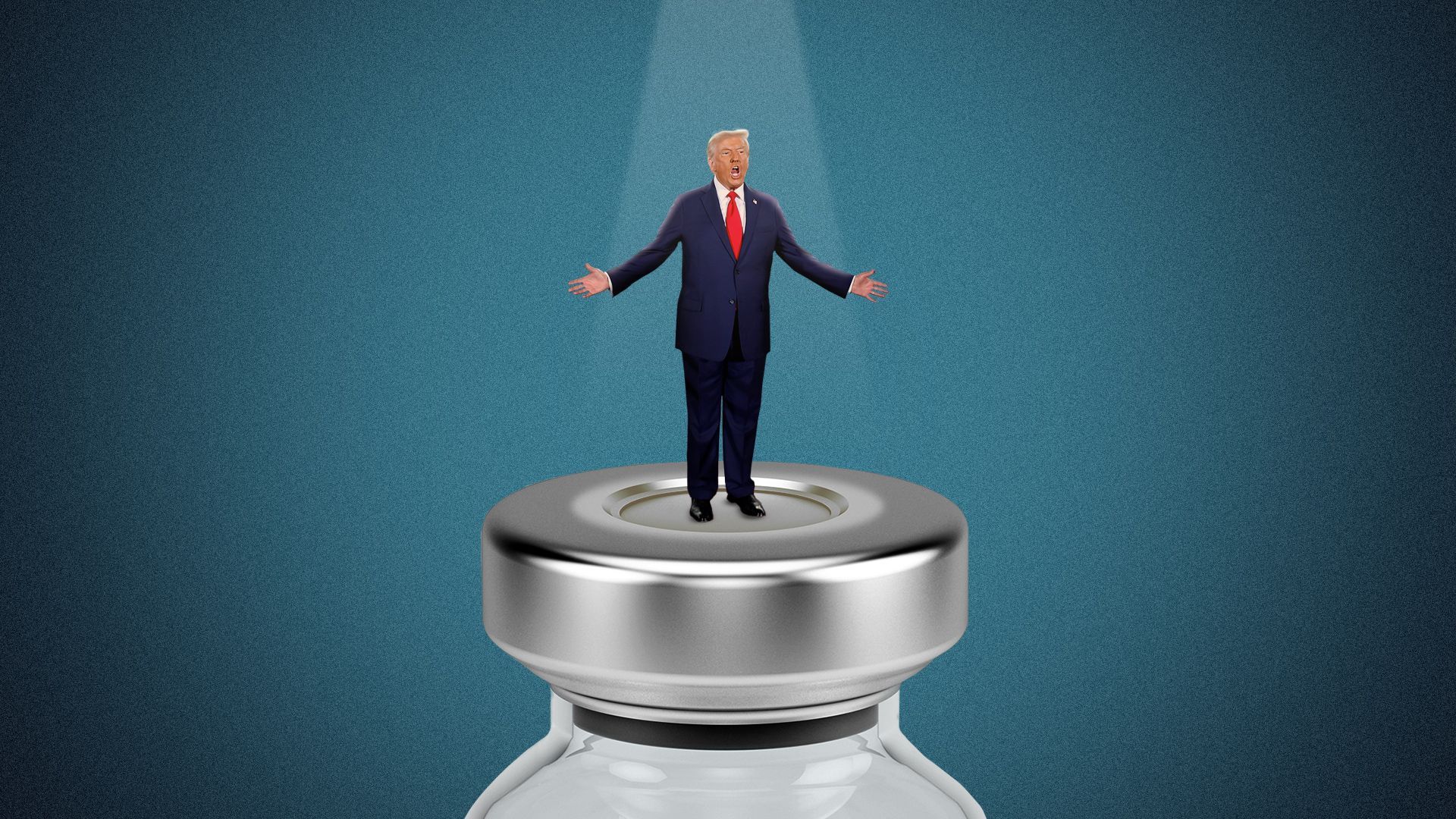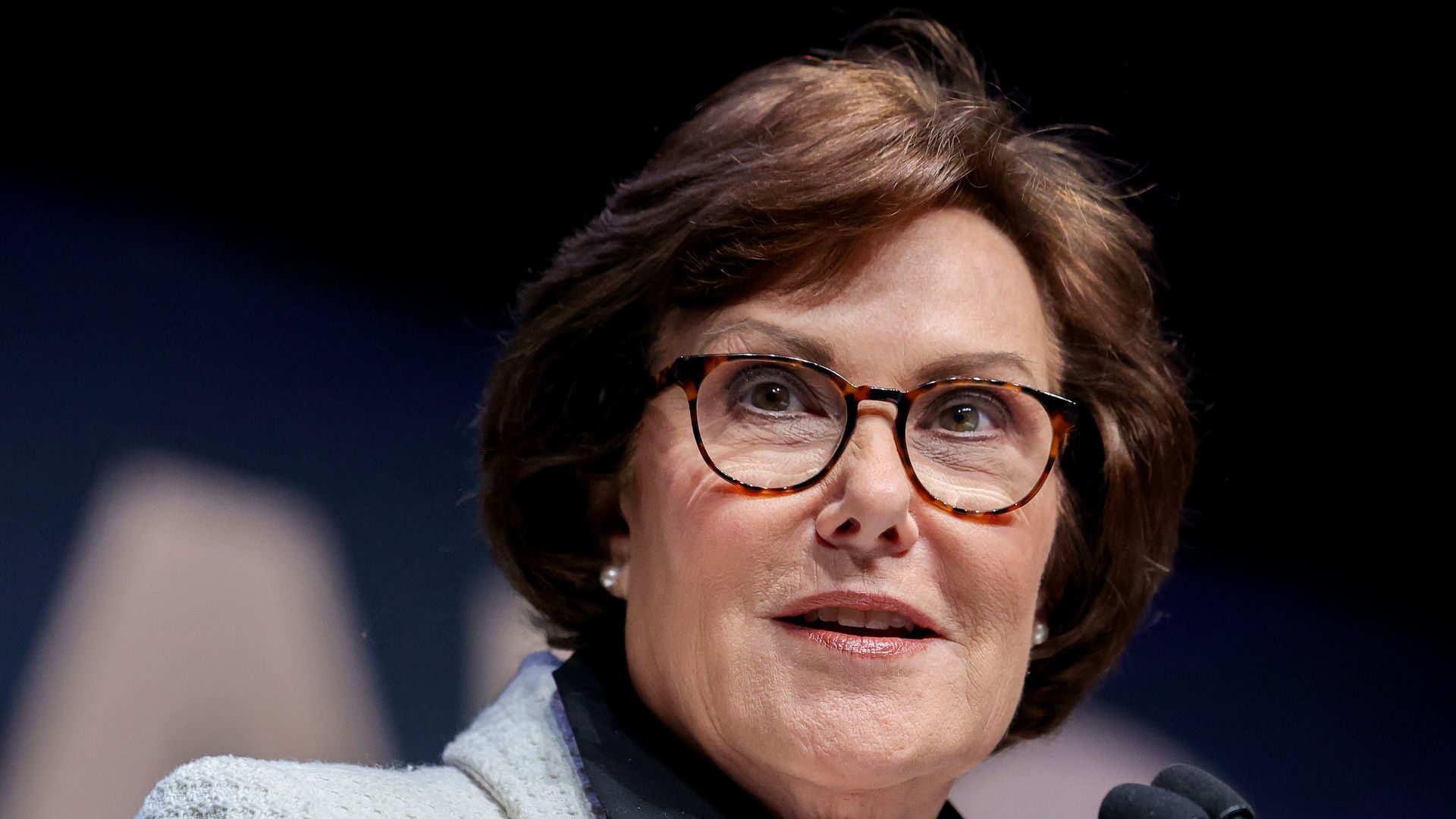| |
|
|
| |
|
PRESENTED BY THE HEALTHCARE DISTRIBUTION ALLIANCE
|
| |
|
Axios Vitals
|
|
By
Tina Reed, Maya Goldman and Peter Sullivan
·
Sep 16, 2025
|
|
Hello Tuesday! Today's newsletter is 1,005 words or a 4-minute read.
|
| |
| |
|
1 big thing: Reality check for Trump's drug ad curbs
|
|
By Tina Reed
|
| |

|
|
|
Photo illustration: Aïda Amer/Axios. Photo: Chip Somodevilla/Getty Images
|
| |
|
President Trump's high-profile crackdown on drug advertising could quickly hit a wall due to legal challenges and the changing ways medicines are marketed to the public. Why it matters: Trump's targeting of misleading direct-to-consumer ads isn't backed by legal authority to ban pharmaceutical advertising. - Instead, it hinges on threatened sanctions and public shaming — and on health agencies whose staffs were depleted by layoffs and retirements.
Driving the news: Trump last week ordered stepped-up enforcement of prescription advertising laws, especially in how safety risks about drugs are disclosed in advertisements. - To do that, the FDA is initiating a process that would dial back advertising rules to standards that were in place in the late 1990s, when drugmakers had to present more comprehensive risk information.
- It's also sent 100 cease-and-desist letters to companies whose ads were deemed deceptive — and thousands more warnings to companies with misleading ads.
The enforcement not only targets drugmakers but affects telehealth companies like Hims & Hers that in recent years have branched into delivering customized copycat versions of drugs to patients. - Another challenge is what to do about health influencers who promote treatments online and weren't around the last time drug advertising regulations changed.
- "The world in 2025 is entirely different from 1997. We have celebrities and influencers touting cures on television and social media, and television avenues that didn't exist before the turn of the millennium," said Robin Feldman, a professor at the University of California Law San Francisco. "As advertising changes, the FDA must keep pace."
Court challenges are likely on free speech grounds. - "The industry will do everything in its power to challenge any policy changes in court — a tactic that has previously proven successful," said Emarketer health care analyst Rajiv Leventhal. Broadcasters and other beneficiaries of the drug industry's advertising dollars may also pile on.
Keep reading
|




|
| |
| |
|
2. RFK Jr. adds five more to key vaccine panel
|
|
By
Tina Reed and
Maya Goldman
|
| |

|
|
|
Kennedy outside the White House last week. Photo: Win McNamee/Getty Images
|
| |
|
Health Secretary Robert F. Kennedy Jr. yesterday added five members to serve on his handpicked vaccine advisory panel just days ahead of a key meeting where the group will make recommendations for who should get COVID shots. Why it matters: Some of the new members were critical of the pandemic response or faced charges of spreading misinformation. - The Advisory Committee on Immunization Practices is due to meet Thursday and Friday to discuss COVID boosters that the FDA approved for at-risk populations, as well as new recommendations on the MMR and hepatitis B vaccines.
The new members are: - Kirk Milhoan, pediatric cardiologist and former U.S. Air Force flight surgeon based in Hawai'i, who was accused — and then cleared by the state medical board — of spreading COVID-19 misinformation. He's a member of the Kennedy-aligned group Independent Medical Alliance.
- Catherine Stein, a professor and epidemiologist at Case Western Reserve University in Ohio who called for an end to vaccine mandates. She criticized the state's models for crafting its policy response to COVID as "cloaked in secrecy" in testimony to state lawmakers in 2020.
- Hilary Blackburn, a pharmacist and director of medication access and affordability at AscensionRx in Missouri, per LinkedIn. She hosts a podcast called "Talk to Your Pharmacist."
- Raymond Pollak, a surgeon and transplant specialist who appears to have brought a whistleblower case against the University of Illinois Hospital in 1999 for diagnosing patients as sicker than they actually were to increase transplant cases and qualify for more reimbursement.
- Evelyn Griffin, an OB-GYN in Baton Rouge, Louisiana. She is also trained in lifestyle medicine and functional medicine, according to HHS.
More here
|




|
| |
| |
|
3. Senate Dems target GOP over vaccine rollbacks
|
|
By Stephen Neukam
|
| |

|
|
|
Rosen in Las Vegas last year. Photo: Ethan Miller/Getty Images
|
| |
|
Senate Democrats today will introduce a resolution condemning anti-vaccine policies Republicans are pursuing at the national and state level. Why it matters: Democrats are putting Republican lawmakers on the spot, by trying to force an up-or-down vote on whether to condemn Florida officials' decision to end all vaccine mandates — as well as the anti-vaccine policies Kennedy is implementing. - Democrats, led by Nevada's Jacky Rosen, will try to pass the resolution on the Senate floor today, we are told. Just one Republican could block the move — and one likely will.
The big picture: Republican officials keep taking steps to roll back vaccine requirements, despite polling showing voters overwhelmingly support routine childhood shots. Between the lines: Democrats are pressing on fault lines within the GOP over the efficacy of vaccines. Even President Trump publicly split with Kennedy on the matter earlier this month. - Sens. Adam Schiff (D-Calif.), Chris Van Hollen (D-Md.) and Dick Durbin (D-Ill.) are co-sponsoring the resolution.
Read more
|




|
| |
| |
|
A MESSAGE FROM THE HEALTHCARE DISTRIBUTION ALLIANCE
|
|
Delivering 10M+ medicines across America each day
|
| |

|
| |
|
Distributors keep America’s healthcare supply chain moving — delivering common medicines and complex treatments across the country.
Why it’s important: Distributors are the only supply chain entity to take legal ownership, financial risk and physical possession of medicines.
Learn more.
|
| |
| |
|
4. 16% of parents skip or delay kids' shots
|
| |

|
|
|
Illustration: Sarah Grillo/Axios
|
| |
|
About 1 in 6 parents say that they've delayed or skipped at least one vaccine for their children, a new KFF-Washington Post survey finds. - That doesn't include immunizations for COVID or the flu, whose uptake is generally low for all groups.
What they found: A large majority (81%) of parents say that public schools should require students to get the measles and polio vaccines, with exceptions for medical and religious reasons. - The most common reasons cited for skipping vaccines for kids were concerns about side effects, a lack of trust in vaccine safety and a belief that not all recommended vaccines are necessary.
- Parents most likely to report delaying or skipping shots are those who homeschool their child (46%), white parents who identify as "very religious" (36%) and Republicans (22%).
- Confidence in federal health agencies is shaky, with fewer than 1 in 6 (14%) parents saying they have "a lot" of confidence in agencies like the CDC and the FDA to ensure the safety and effectiveness of vaccines.
Explore the data
|




|
| |
| |
|
5. Catch up quick
|
| |
|
⚕️ As Kennedy pushed his MAHA agenda, federal cuts shut down California health and nutrition programs. (Cal Matters) |





